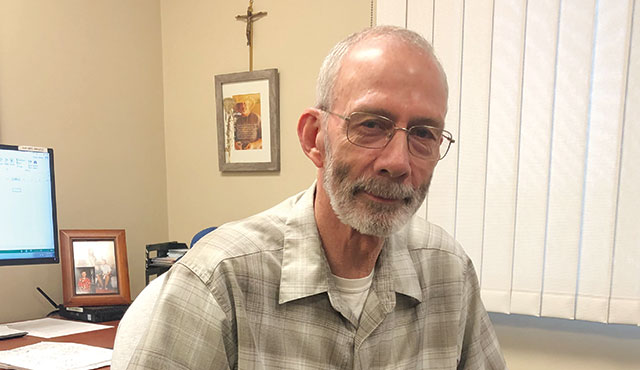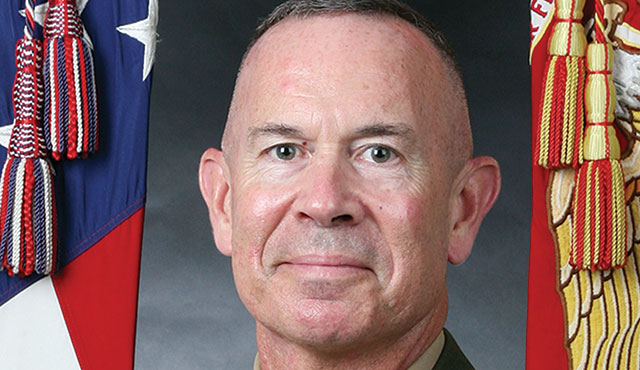For Father Kevin Sweeney, his work as Command Chaplain at Marine Corps Base Camp Pendleton is a calling within his calling to the priesthood.
“You have to be willing to go where the marines and sailors are,” says Fr. Sweeney, a U.S. Navy captain. “The field is where you do your best ministry, when you are away from everything.
“Commanding officers recognize that they don’t want to go into battle without a chaplain,” he adds. “They know the serious nature of battle and that a chaplain will be wherever the crisis is, allowing those who serve to be assured of God’s presence.”
Chaplains serving in the military, in police and fire departments, and in health care fulfill a special role in the Catholic Church, serving both as first responders and medical personnel to community members in crisis.
While Catholics naturally think of priests like Fr. Sweeney as chaplains, many lay people, women in consecrated life, and pastors from other faiths also serve in the field, says David Lichter, executive director of Milwaukee-based National Association of Catholic Chaplains.
The association, which advocates for the profession of Catholic spiritual care and educates, certifies, and supports chaplains, clinical pastoral educators, and all who continue the healing ministry of Jesus in the name of the Church, has 2,000 members, about two-thirds of which are lay men and women.
Members of the association undergo a rigorous certification process, Lichter says. “We value individuals who are caring and compassionate, comfortable in a crisis situation, and those who can work comfortably with people in the margins,” he notes. “In the middle of chaos, they must be a peaceful presence.”
Care from a chaplain is critical to healing as there is a great loneliness that permeates patients’ lives, says Bill O’Brien, an Orange resident and board-certified chaplain at St. Joseph Hospital.
“So many people are isolated and alone,” O’Brien says. “Part of our privilege with this ministry is that we are the only ones on the hospital team who can sit with them, be present, and remain open to what unfolds. You never know; they can have major spiritual and emotional needs in their lives, and they need another human being to talk to.”
Recently, he recalls, a patient’s family realized death was imminent for their loved one and a chaplain helped them process their grief. “Part of our discipline is to be present and to follow what God has put you there for.”
Community Presence Pastor Nathan Zug of Anaheim’s Magnolia Baptist Church serves both the Anaheim Fire and Police departments as chaplain and values his role bringing Christ outside the church to neighborhoods, streets, city hall and beyond. “The city streets are my parish,” Zug says.
“It’s very rewarding to be able to assist people in their worst moments by giving them care, friendship, and presence,” he notes. “It’s about being with people who are suffering and having the wherewithal to be on scene and in the moment, as a steady and peaceful presence.”
In addition to empathy and calmness, he says, the best chaplains are objective because they deal with many people from different ethnicities, cultures, and faith traditions. “The role of chaplains and pastors are really important in the community,” he says. “Pastors are assigned to a place and take care of people connected to that denomination. Chaplains do the same thing with many different kinds of people. The community needs both roles.”
Father John Neneman, pastor of San Antonio de Padua Catholic Church in Anaheim Hills, serves as chaplain with the Anaheim Police Department, and says his chaplaincy work informs his job as pastor.
“Chaplains look on their work as a labor of love and I do find it rewarding,” Fr. Neneman says. “It gets me out of my head and away from the parish and our own enclosed environment and lets me interact with people and other professionals that I can’t in my work as pastor.
“I bring my experiences back, and I am able to elevate my skills and learn new ones,” he adds. “The parishioners love it, too. I’m happier when I’m challenged in certain ways.”
Chaplains never know when they will be called into service, notes Bob Barnett, senior chaplain with the Santa Ana Police Department and pastor at Fullerton’s Seekers Chapel. They assist first responders, who often have troubled minds and contemplate suicide or violence. On scene, they deal with people who are receiving the worst news possible – the murder of a loved one, or a horrific accident that claims the life of their child.
“You have to be prepared,” Barnett says. “You can be called in the middle of the night so you must be prepared to minister at any time, not just during a service on Wednesday night or Sunday morning. We see ourselves as peace officers – police officers enforce the law and we enforce the peace.”


